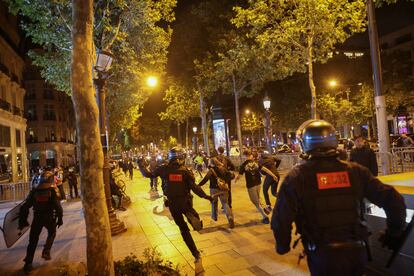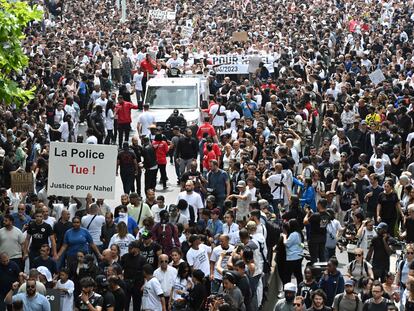Young man arrested for riots in France: ‘I did it to show courage, to be recognized’
The speedy trials of those arrested in the unrest have unveiled the complex psychology that fueled last week’s violence


“I’m sorry.” These two words are repeated at the end of many of the hasty trials, known as comparutions immédiates, that are being held in courts across France. On trial are the people who took part in the riots sparked by the death of 17-year-old Nahel Merzouk, who was shot dead by a police officer near Paris.
The defendants sit in the dock looking contrite, fearful of what sentence may befall them. Some say they got carried away by the heat of the moment. Others say they were fueled by the rage they felt at seeing Nahel shot dead in videos on social media.
“I know it isn’t right,” a man accused of participating in an attack on a police station said Tuesday, “but that’s how it happened.”
It’s an afternoon at the Palace of Justice in Bobigny, the capital of the Seine-Saint-Denis department, the largest on the northern outskirts of Paris. Detainees from the nights of the riots are taking the stand through rooms 13 and 17. Before the public that fills the packed halls — mothers and girlfriends, fathers and friends — the complex sociology behind the violence unleashed against police stations and town halls, public buses and private vehicles, schools and shopping centers is revealed.
“I did it to show courage, to be recognized.” In room 13, Emmanuel, 19, a first-year law student who wants to switch to psychology, takes the floor. He talks about the moment, caught on video, in which he took part in the assault on Bobigny City Hall. He is on trial with his friends Mickael and Suleiman, both 18 years old.
The three live in the Cité Paul Éluard, an ugly housing complex just a short distance from the Bobigny Palace of Justice, sandwiched between National 186 and Lenin boulevard. This is the old red-light district. And these are the neighborhoods where, in the 1960s and 1970s, immigrants arriving from the north and sub-Saharan areas of Africa came together. They are the parents and grandparents of boys like the three on trial. Or like Nahel.
Emmanuel is accused of having assaulted City Hall along with 50 people armed with stones and Molotov cocktails. Unfortunately for Emmanuel, he lost his cellphone in the middle of the action. The police found it inside the building and came upon the evidence that led to the trial.
On the phone, the police discovered the messages that a group of friends from Cité Paul Éluard had sent to each other on the Snapchat social network. That’s how they came to arrest Mickael, who had written of fire and destruction: “This is war, and we are going to take advantage of it, because war doesn’t happen every day.”
Thanks to the Snapchat application, the police also located Suleiman, who lives with his grandmother. At her home, they found dozens of sportswear items, some from the Adidas brand. The clothes had been taken from the Avenir shopping center, in the neighboring municipality of Drancy, which was looted after a group smashed open the entrance with a truck. At Emmanuel’s home, police also seized with a Colt 1905 pistol, which Emmanuel said he found in a neighborhood subway. He was seen waved the gun defiantly in photos, according to prosecutors.
“Why incite violence by talking about war?” they asked Mickael, who replied: “I wasn’t serious, I did it to give myself an image.” And what led Suleiman to participate in the looting of a shopping center? “I saw that they had driven through a truck, I wanted to go in, I helped myself, I thought it was free clothes and that, since I don’t have an income, I could have some new clothes.”
There isn’t an exact portrait of the people who took part in the riots in France, which caused more than €1 billion in estimated damages, led to the deployment of 45,000 police officers and gendarmes, forced French President Emmanuel Macron to change his international schedule and projected an image of chaos in France one year before the Olympic Games in Paris. There is no single type of agitator, but local news outlets are beginning to define the profiles of the more than 3,000 people who were arrested in the unrest.
The youngest are between 12 and 13 years of age; while the oldest are in their thirties, according to French newspaper Le Monde — a profile confirmed by government reports that have been leaked to the press. Among those arrested, there are common criminals. But also young people who go to school or university, and who because of their origins — their first and last name, the color of their skin, their place of residence — feel discriminated against in the labor market and mistreated by the police.
There are fragile families, absent parents, teenagers going through tough times — youngsters like Suleiman who told the court about his experience losing his father to cancer when he was 12, and dropping out of school, when he was one year away from finishing. Suleiman was on probation for other thefts when he joined the looting, but he says that he wanted to rebuild his life and works as an orderly in a hospital.
One floor below the Palace of Justice, in room 17, a 34-year-old man is on trial. He is one of the oldest of the bunch. He’s the man who was caught with the mob that stormed a police station in Villepinte, north of Bobigny, near Charles de Gaulle airport. He lives with his parents, who were in the front row of the court, he earns between €600 and €700 per month, which he supplements with a subsidy.
“Would you like your house burned down?” the judge asks. The accused responds: “No.” At another point, he says that taking part in the riots were “the way to be heard” after the death of Nahel, which he described as “an injustice.” “And do you think your parents will be proud of you? Maybe you embarrass them,” the judge asks. The defendant responds: “I don’t know... I reacted badly.” Then the judge reminded him that his retired parents had been an ambulance driver and a caregiver, “useful jobs for society, jobs to help others... like a police officer!”
The defense lawyer points to the “psychological difficulties” of the defendant, a man with severe vision problems and who, nevertheless, joined the front line of the riots. When the court pronounces the sentence a few minutes later — six months in prison — the mother exclaims: “How can they do this? A disabled child is not even responsible! Where is the justice?”
Upstairs, in room 13, Emmanuel, Mickael and Suleiman speak for the last time about the assault on the Bobigny City Hall: “I am a boy filled with dreams. I have no criminal record. I am studying. They want to take everything from me for 30 minutes of curiosity,” says Emmanuel. Mickael adds: “I’ll just say that I apologize for what happened.” Suleiman concludes: “I did not have a male role model in my life. I have had to learn by myself. What I am asking for is an alternative to prison. What I am asking for to re-enter the Republic that I love.”
Emmanuel was sentenced to 18 months in prison and Suleiman to 12. Mickael was released with an ankle bracelet.
Sign up for our weekly newsletter to get more English-language news coverage from EL PAÍS USA Edition
Tu suscripción se está usando en otro dispositivo
¿Quieres añadir otro usuario a tu suscripción?
Si continúas leyendo en este dispositivo, no se podrá leer en el otro.
FlechaTu suscripción se está usando en otro dispositivo y solo puedes acceder a EL PAÍS desde un dispositivo a la vez.
Si quieres compartir tu cuenta, cambia tu suscripción a la modalidad Premium, así podrás añadir otro usuario. Cada uno accederá con su propia cuenta de email, lo que os permitirá personalizar vuestra experiencia en EL PAÍS.
En el caso de no saber quién está usando tu cuenta, te recomendamos cambiar tu contraseña aquí.
Si decides continuar compartiendo tu cuenta, este mensaje se mostrará en tu dispositivo y en el de la otra persona que está usando tu cuenta de forma indefinida, afectando a tu experiencia de lectura. Puedes consultar aquí los términos y condiciones de la suscripción digital.










































